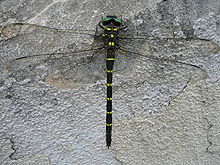Anotogaster sieboldii, as known as golden-ringed dragonfly, jumbo dragonfly, Siebold's dragonfly or oniyanma (オニヤンマ、鬼蜻蜓、馬大頭) in Japanese, 無霸勾蜓 in Chinese and 장수잠자리 ("jang-su-jamjari", means 'General Dragonfly') in Korean is the largest species of dragonfly native to Eastern Asia, especially Japan, Taiwan, China, Korean Peninsula.[1] It can grow between 95 and 100 mm in length.[2]
| Anotogaster sieboldii | |
|---|---|

| |
| Adult | |
| Scientific classification | |
| Domain: | Eukaryota |
| Kingdom: | Animalia |
| Phylum: | Arthropoda |
| Class: | Insecta |
| Order: | Odonata |
| Infraorder: | Anisoptera |
| Family: | Cordulegastridae |
| Genus: | Anotogaster |
| Species: | A. sieboldii
|
| Binomial name | |
| Anotogaster sieboldii Sélys, 1854
| |
Life cycle
editEggs hatch within a month of being laid. Nymphs can live for three to five years, moulting as many as ten times and growing as large as five centimeters in length. Like adult dragonfly, nymphs are obviously predatory insects. Once nymphs reach sufficient size, they hunt tadpoles, aquatic insects and small fish. The adult dragonfly mate and lay eggs within one to two months of metamorphosis. After mating, females head toward small creeks or ponds, not fast-moving rivers or lakes, to lay eggs. They will sometimes fly perpendicularly to the water, laying their eggs in mud or sand under the surface.
Notes
edit- ^ 한국의 잠자리 (The Dragonflies and Damselflies of Korea), 자연과생태 (http://www.econature.co.kr/), 2012.
- ^ ふしぎがわかる しぜん図鑑 こんちゅう, page 35. Froebel-Kan CO., LTD., 1999
References
edit- ふしぎがわかる しぜん図鑑 こんちゅう (in Japanese). Tokyo, Japan: Froebel-Kan CO., LTD. 1999. p. 35. ISBN 4-577-00033-4.